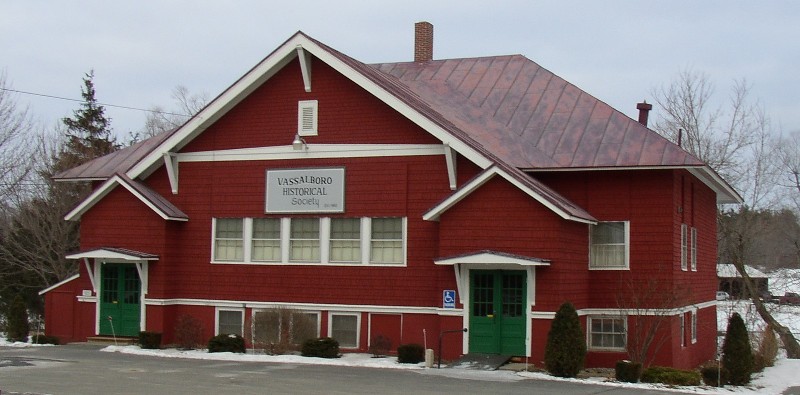Not surprisingly, the Covid-19 pandemic dominated discussion at the Vassalboro School Board’s Nov. 17 meeting, leading to reluctant decisions and much praise for everyone involved in keeping the town school safe.
The most unenthusiastic decision was to postpone winter sports – basketball and cheerleading – as Assistant Principal Greg Hughes recommended. In addition to concern about indoor sports potentially spreading disease, the gymnasium is hosting after-school child-care until 5:30 p.m., severely limiting its use for sports, Hughes said.
Board member Jolene Gamage called the unanimous decision “unfortunate but understandable.” Given the unpredictability of the virus’s spread, board members agreed to revisit the issue at their December and January meetings.
On the recommendations of Superintendent Alan Pfeiffer and Principal Megan Allen, board members also agreed unanimously to continue the Wednesday early release days at least through January 2021. The class-free afternoons give teachers valuable time to continue to adapt their teaching materials and methods to remote learning and to exchange ideas and suggestions, Allen said.
Reports from Pfeiffer, Allen, school nurse MaryAnn Fortin and teacher/technology coordinator David Trask assured board members things are going well at Vassalboro Community School, under the circumstances.
There was heavy emphasis on safety measures for students, staff and families.
VCS has just reopened on an alternate-days basis after two weeks of 100 percent remote learning after one positive coronavirus test. Allen believes the closure averted a possible spread of the virus.
“I feel really good about that call. I think the CDC (Center for Disease Control and Prevention) recommendation was spot on,” Allen said. She thanked Pfeiffer and Fortin for supporting the decision.
Pfeiffer in turn thanked all the staff for being “hypervigilant” and doing more than their required jobs when necessary. Having no precedents to follow makes their situations extremely difficult, he pointed out.
Pfeiffer said he is in frequent touch with superintendents throughout Maine, especially those in the immediate area, and with Erskine Academy Headmaster Michael McQuarrie. On Nov. 17, following a third reported case of coronavirus, McQuarrie announced that Erskine would go to fully remote classes until Nov. 30. He emphasized that each case originated outside the South China high school; there has been no evidence of transmission inside the school.
Fortin expects soon to receive a supply of rapid-screening tests that can be given to staff members or students who show symptoms that might be coronavirus, with parental permission before a student is tested.
Vassalboro has a shortage of bus drivers, Pfeiffer said. Retired driver Ellie Lessard has returned to work as a substitute, and, Director of Finance Paula Pooler added, a four-week driving course attracted 12 students.
Pooler said Vassalboro has one new bus on the road and three more expected in December, purchased with Covid-19 money. Paperwork for the federal grants is keeping the business office “right out straight,” she said, but so far grants have provided enough money so that the school budget “has not been hit yet” by adaptations to the virus.
Trask’s report described some of the many steps that were needed to implement remote learning, especially buying technological equipment for students and staff. All students and staff members now have computers, he said. There are still a few students who do not have adequate cellphone or internet access to make distance learning easy.
Trask told board members additional equipment, technical support and money to maintain and repair the greater number of devices will be needed. He thanked Pfeiffer, Allen, Hughes and multi-school technical coordinator Will Backman for supporting his requests in March. As a result, he said, VCS was ready for remote learning the day school re-opened.
Backman told Trask, “You embody Vassalboro’s can-do attitude.” School Board Chairman Kevin Levasseur agreed.
In other business, board members accepted with regret Amy Benham’s resignation as special education director for Vassalboro and Winslow. Pfeiffer said the two school departments had advertised for a shared position and had no responses; now he and Winslow Superintendent Peter Thiboutot are advertising separately.
The next Vassalboro School Board meeting will be at 6 p.m., Tuesday, Dec. 15. It is almost certain to be a virtual meeting.











 The Vassalboro Community School Jobs for Maine Graduates (JMG) program will be doing their annual Christmas wreath sale, starting right now until the week after Thanksgiving. They will still be taking orders when they get back from Thanksgiving break.
The Vassalboro Community School Jobs for Maine Graduates (JMG) program will be doing their annual Christmas wreath sale, starting right now until the week after Thanksgiving. They will still be taking orders when they get back from Thanksgiving break.
 STUDENT WRITERS PROGRAM
STUDENT WRITERS PROGRAM